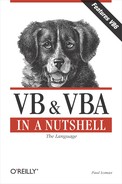| IIf Function |
Named Arguments
Yes
Syntax
IIf(expr, truepart, falsepart)
expr
Use: Required
Data Type: Boolean
Expression to be evaluated.
truepart
Use: Required
Data Type: Any value or expression
Expression or value to return if expr is True.
falsepart
Use: Required
Data Type: Any value or expression
Expression or value to return if expr is False.
Return Value
The value or result of the expression indicated by truepart or falsepart.
Description
Returns one of two results, depending on whether expr evaluates to True or False.
Rules at a Glance
IIf always evaluates both the truepart and falsepart expressions independently of the value of expr. You must therefore ensure that both expressions can be safely evaluated when the IIf function is called or an error is generated.
The IIf function is the equivalent of:
If testexpression Then result = truereturn Else result = falsereturn End If
The only difference is that, in the corresponding If...Then...Else...End If statement, only one of either truepart or falsepart is evaluated, depending on the result of expr.
truepart and falsepart can be any one variable, constant, literal, expression, or the return value of a function call.
Programming Tips and Gotchas
The IIf function is ideal for very simple tests resulting in single expressions. If you really feel the need, IIf function calls can be nested; however, your code can become difficult to read quickly. The following code fragment illustrates the use of a nested IIf function:
Dim x As Integer
x = CInt(Text1.Text)
MsgBox IIf(x < 10, "Less than ten", IIf(x < 20, _
"Less than 20", "Greater than 20"))